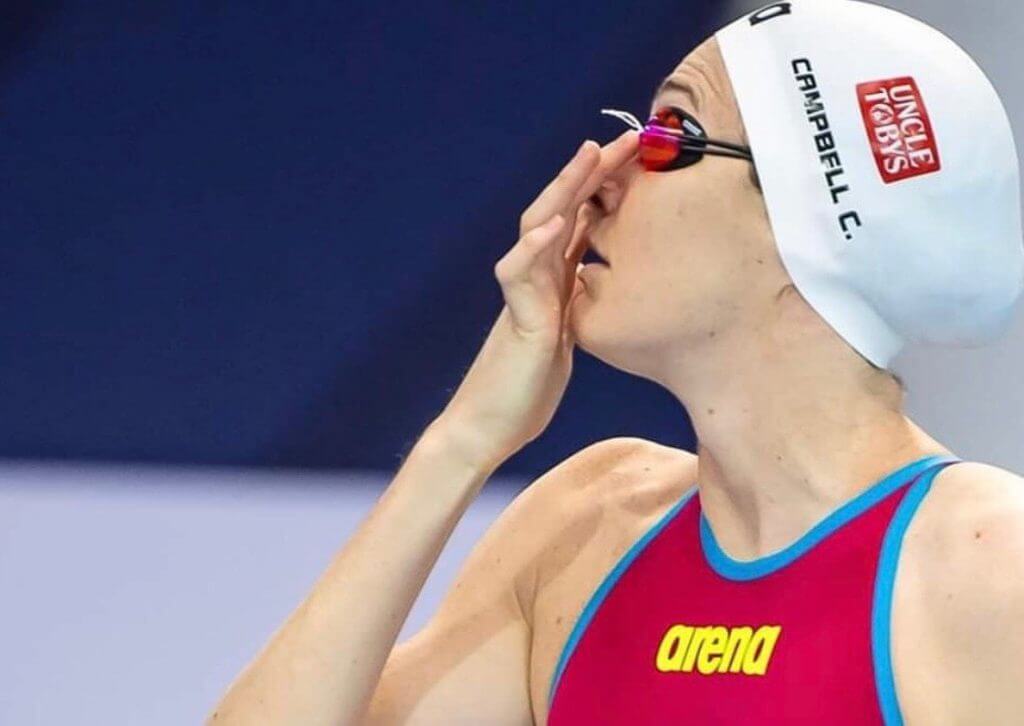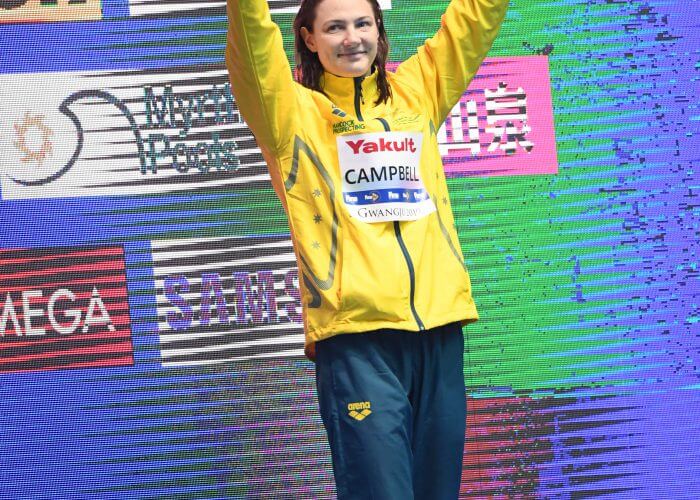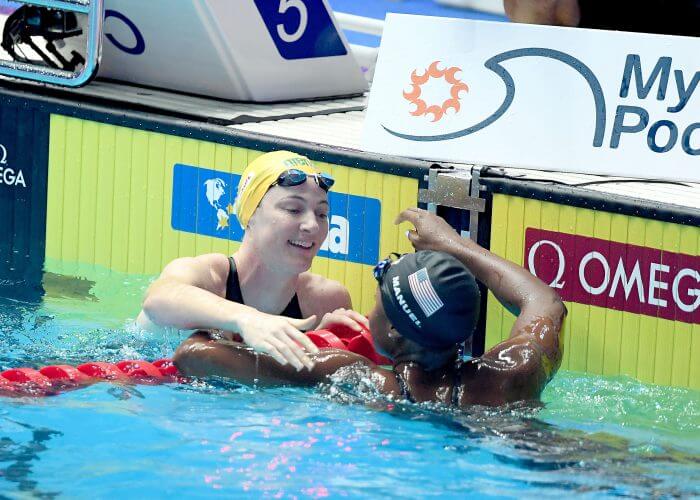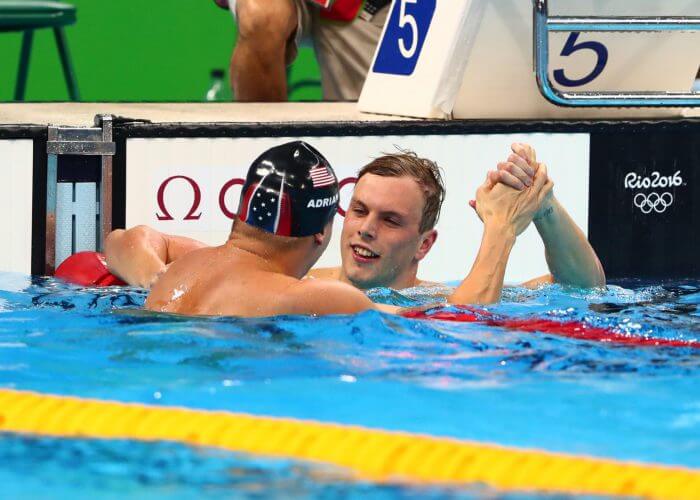Cate Campbell Ready To Roar As Richest Prize-Pool Winner In Dolphin History

Cate Campbell Ready To Roar – A $ Deposit A Part Of Her Pantheon Treasure
Cate Campbell, Australian swimming’s queen of the fast pool, is poised to strike it rich in what will be the most daring “splash and grab” raid of her illustrious career over the next two months.
Fresh from taking out the $A73,000 winners cheque after the lucrative five-meet FINA World Cup Cluster climaxed in Berlin, the 27-year-old will now make her debut in the multi-million dollar International Swimming League, in Lewisville, Texas, this weekend.
If things go according to plan, Campbell will become Australian swimming’s richest ever prize-money earner in a single year.
The evolution of professional swimming in 2019 sees Campbell in the right place at the right time to cash in on Cup and League.
With her ISL team, the London Roar, not scheduled to race the first two rounds in Indianapolis and Naples, it allowed the triple Olympian to concentrate on the struggling FINA World Cups – with handsome dividends.
The format of the Cup means that there are big prizes only for the few at he pointy end of business, while poor attendance has made the path of superstars out to earn the top sums that much smoother.

Cate Campbell Photo Courtesy: Delli Carr (Swimming Australia)
And the way the schedule falls over the next two-and-a-half months in the run up to Christmas, Campbell will be able to cash in on the best of both worlds as the sport heads towards a “World Series Cricket” type era that will be a major boon for the athletes.
Following this weekend’s ISL round where swimmers will be racing for team points and prize-money, Campbell will then head to Budapest for the Roar’s second appearance on October 26 and 27.
It will then be off to Kazan in Russia for the next round of the FINA World Cup before the final Cup round in Doha, Qatar, from November 7-9, when the winners will be handed their purses.
And after a two-week training stint it will be ‘London Calling’ for the Roar, the penultimate League round scheduled at the 2012 Olympic Aquatics Centre on November 23 and 24.
The best four teams, two U.S. based, two Europe-based, will then head for a hunt of riches at the ISL Final Match in Las Vegas on December 20-21 at the swish Mandalay Bay Resort and Casino.
For athletes used to dorms and up to 4-star hotels, the Las Vegas experience will be a rare one: the League has pledged that athletes comes first and if there is to be 5-star accommodation and business-class travel, it will be swimmer-first, blazer/organiser no better than anything available to athletes.
In The Money
Overall female winner in the World Cup series is worth a cool $A220,000 to the winner, $146,000 to the runner up and $A73,000 for third.
At the moment Campbell (243 points), holds a slender lead over Hungarian Iron Lady Katinka Hosszu (240pts) with Sweden’s Michelle Coleman (135pts) third.
The groundbreaking ISL sees athletes paid both a salary and with the incentive to earn prize money based on their individual and club finishes.
Over $A250,000 in prize money is awarded at each regular season match, with nearly $A2million in prize money available for December’s championship meet in Las Vegas with men and women sharing equal prize-money.
In an interview in the lead up to the ISL, Campbell said that more opportunities to make a living will help keep swimmers going and for herself it will definitely take her up to 2022.

Cate Campbell and Simone Manuel – Photo Courtesy: Delli Carr (Swimming Australia)
Campbell, Olympic gold in the 4x100m freestyle at London 2012 and Rio 2016, and the 4x100m free and 100m free world record a part of her pantheon, said:
“We want to encourage young people to take up the sport of swimming and see that there is a future and that they can earn a living, that they can have these opportunities that other sports offer. We’re ushering in a new age of swimming and, hopefully, it’ll encourage more people to stick around in the sport.”
She added: “How I plan to use all these extra competitions is to get good race practice… I’m actually going to incorporate this into my training, I’ll be using this to make sure that I can peak and be at my best for a world championships or an Olympics.”
The ISL has brought a long-overdue competitive edge to the fast pool. FINA has had to respond, and both League and FINA have now injected multi-million financial rewards into to their respective offers.
Perfect timing for swimmers in the countdown to Tokyo 2020
Campbell and super sibling Bronte, along with 17-time World Championship medallist Emma McKeon, Holly Barratt, Minna Atherton, Taylor McKeown and Jess Hansen make up the Australian contingent on a roaring women’s Roar roster.

Kyle Chalmers and Nathan Adrian at the handing over of the Olympic 100m free crown in Rio – Photo Courtesy: Rob Schumacher-USA TODAY Sports
Olympic champion Kylie Chalmers, former breaststroke world record holder Matt Wilson and Gold Coast freestyle trio, Cam McEvoy, Alex Graham and Elijah Winnington bolster the Roar men’s team led by British breaststroke superstar Adam Peaty (who is sitting out the Roar’s opening round). The super-speedy contingent has been built by Australian Olympic medallist of 1984, London-based team manager Rob Woodhouse.
Adrian, the London 2012 Olympic 100m freestyle champion who handed over his crown to Chalmers, an Aussie teen at the time, have both had healthy scares to deal with of late.
Not to be out done fellow Dolphins Clyde Lewis, Jack McLoughlin and Madison Wilson will line up with a “United Nations” New York Breakers team led by US pair Michael Andrew and Lia Neal in a Group B match also featuring the Ryan Murphy, Nathan Adrian led LA Current and the European Iron team spearheaded by the multi-talented Hungarian Katinka Hosszu and big-time sprint pair Ranomi Kromowidjodjo (NED) and Vladimir Morozov (RUS).

Photo Courtesy: isl.global
The ISL will appear under its current format for the two years before it is let loose on the sporting landscape to stand on its own two feet as it goes to the market for sponsorship, television broadcast rights and gate takings.
It is a Series that sees the world’s best swimmers competing for significant prize money with a first season budget of US$20m, funded by the ISL’s founder, Ukrainian billionaire and swimming fan Konstantin Grigorishin: $7m of that will go to athletes and teams in prize money.
The ISL season involves teams of 24 (12 men and 12 women) competing in short-course sprint, relay and skins races for team points. No athlete who has previously been banned for doping is allowed to swim in the ISL. There are playoffs and finals, individual and club prize money, and appearance money for clubs.
Over 100 Olympians are represented in the ISL, including 41 Olympic gold medallists from the 2016 Olympic Games.





Wish I signed up to officiate at that meet:(